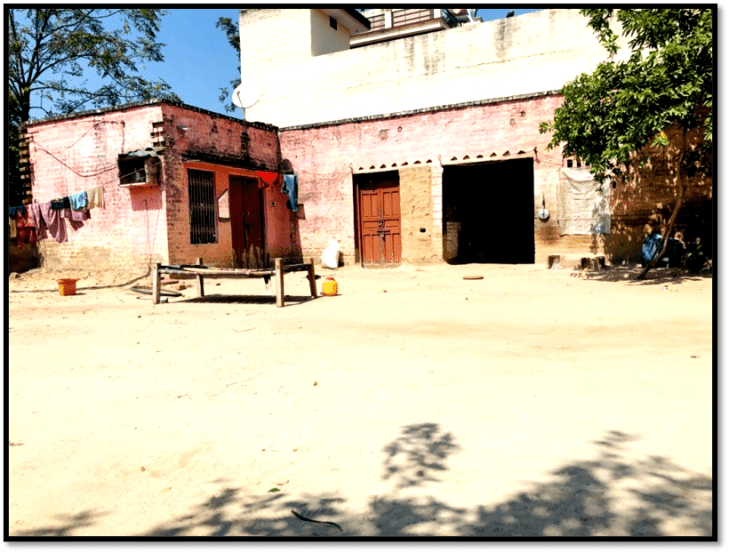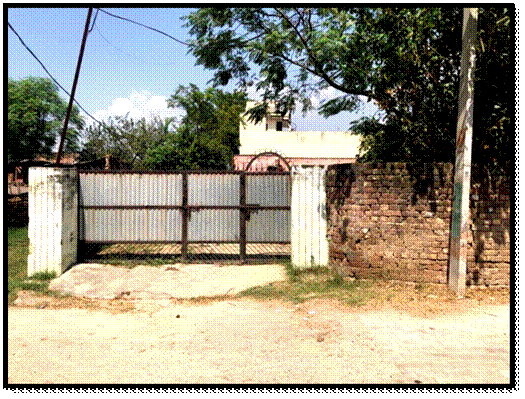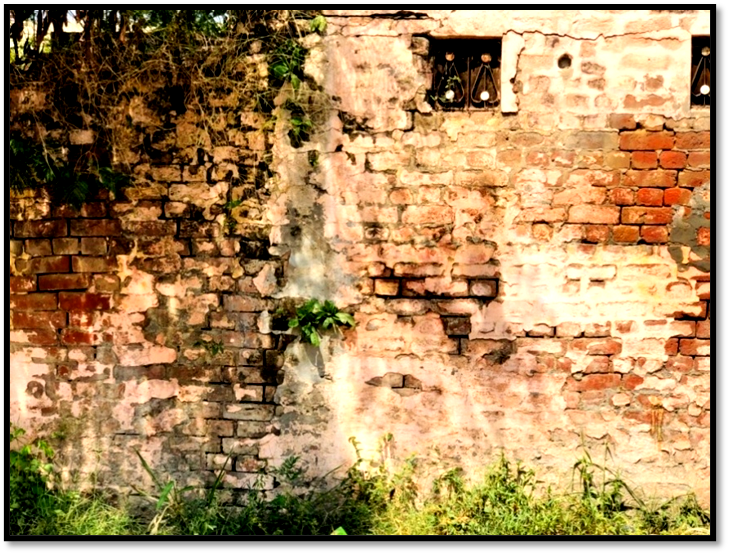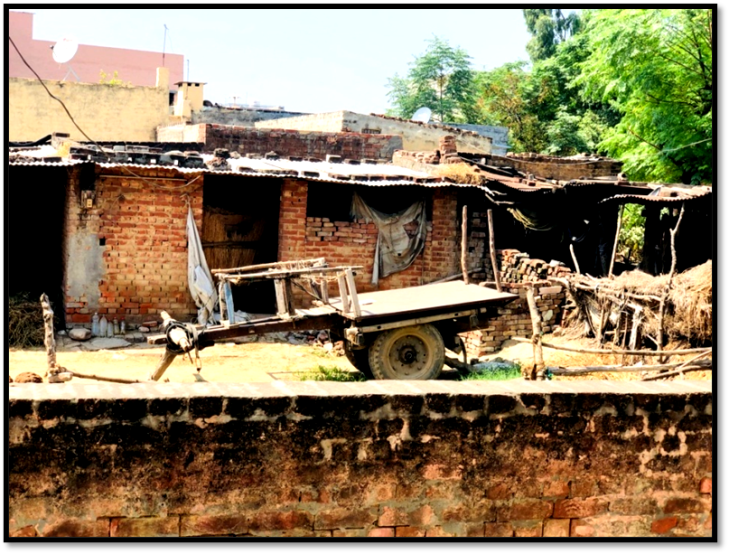
By Sarpreet Kaur
The tires of the car screeched the moment they left the concrete road and stepped on to the rocky village pavement that led to my village in district Hoshiarpur of Punjab. A sudden wave of nostalgia hit me – a tad bit too overpowering than I had imagined it to be. This village lies amidst one of the few green patches that still exists in ever-developing Punjab. It is far away from the hustle-bustle of cities and even farther from the honking and shooing off the highways.
“My Village is transitioning” – this was the first thought that crossed my mind when the dwellings of the village came in sight. On the left side of the road stood a wooden cart accompanied by a lazy ox fanning himself under a big banyan tree; on the right one stood an Endeavour, a four-wheel-drive posing proudly under a green tin-shed. The oxen belonged to the house in its background made of cow dung mixed with mud; behind the Endeavour sparkled a white and brown tiled three-storey building with a marbled floor. I realized my village was changing at a fast pace and I needed to capture my home’s real essence before the sword of globalization cut its throat. My village was made of tiny houses but big hearts. If you want to know the village, you need to know people that lived in it. People are the essence of the village.

The same bumpy road led to this metal rusty gate of my grandparent’s house. The door opens to a wide alley, a dusty cul de sac. When my grandparents were alive, they made sure that this door was never closed; it was an unspoken rule. A couple of years back you could see my grandfather’s four friends sipping tea and talking loudly, as their walking sticks lay lazily on one side. They were a postmaster, a teacher, a farmer, and a mystery man.
The postmaster was the jumpy bearer of happy news like when my dad got a job in the city and a slouchy carrier of sadness like when granddad’s brother died in a terrorist action. He was always there to have a bite of laddoo as well as to provide a shoulder to cry on.
The teacher friend was full of lectures, as they say, “Once a teacher always a teacher.” During school times, he used his stick to straighten the students, to make a man with a spine; after retirement, you could see him loathing the spineless school system where teachers are too afraid of parents and students alike. He used to say how the stars we gaze at are long dead and it is just a memory that we are witnessing. He knew why the deeper earth was so hot and used to tease his wife saying, “Earth is even hotter than you.”
The farmer friend was the busiest one of all, always running errands and sat with them at times. The other friends used to laugh at him saying, “You came on earth running, you will go back running. Stop for a while.” And it happened, He was the first one to leave. It might be because he was always in so much rush that death took him away in a hurry.
The mystery friend is still a mystery. He was a spinster. I don’t know what he did, but he was the happiest of the lot. Nowadays when we define each other in terms of the work we do, this man lived life on another plane. I never wanted to solve his mystery because the curtains made him fascinating.

This wall on one side of our courtyard reminds me of how many generations have survived in this very house. This wall has heard giggle of kids and the sound of sticks on the hands of the same kids. This was the place where the guests robbed us, and this was the place where my grandmother saved money to buy her husband a gold ring. Even on his death pyre, he had that ring on. The wall was pasted with cow dung cakes and smelled of fresh paint. This wall heard the clacking of guns in one generation and moo of cows and a crackle of wooden wheels in the other. And the next generation taught her words.

You do not experience the real village until you have hopped on to this beast. It is called gadda in Punjabi. It is an ox cart. The ox is subtly nudged to move and he does so at the slowest pace. The kids hop on to this: the meek ones sit on the wooden seats, while the pros stand on the flat surface like a surfer. Eventually, these carts became obsolete in my own home like many things around it. The green of the fields was replaced by the brown of weeds; the moo of cows was replaced by the thud of bikes. And now the space shared by four friends is replaced by an eerie silence.

This is my village house, made of small bricks but big hearts. The house where time stops. The house which teaches us to stop for a while because one day everything will disappear. The house where humility reigns. The house which prods me to be a human being again and not just a cog in the wheel of the world.
Bio:
Sarpreet Kaur values being discreet, enjoys reading and has a passion for writing. She has been working as a content writer for last few years. Her articles have previously appeared in The Hindu, New Delhi Times and other leading websites.
***
Like Cafe Dissensus on Facebook. Follow Cafe Dissensus on Twitter.
Cafe Dissensus Everyday is the blog of Cafe Dissensus magazine, born in New York City and currently based in India. All materials on the site are protected under Creative Commons License.
***
Read the latest issue of Cafe Dissensus Magazine, “Travel Writing: A mode of constructing knowledge”, edited by Raeesa Usmani, Surat, India.

“This wall has heard giggle of kids and the sound of sticks on the hands of the same kids.”
A beautiful peace written straight from heart.
It reminds us how helpless we are despite living in fast paced cities.
The author very beautifully describes the innocence, simplicity , humaneness , happiness in simple things in village lives.
This article places a mirror of truth in front of all of us. We have success/materialistic fulfillment , yet we are not happy. Village lives/our elders had minimal materialistic resources but they were happy.
Thanks Sarpreet Kaur.
LikeLike
Thank you so much for carching the real essence of this piece and i am glad it was a good read for you.
LikeLike
Catching**
LikeLike
This article has reminded me …my days when I was innocent , even that time I was not aware of that such a golden time spent in village will make me so emotional and nostalgic which has been triggered by this article … this has given me deep touch of my childhood days…. Thanks to the author Ms Sarpreet Kaur for contributing a real picture of that time village life
LikeLiked by 1 person
Thank you so much for these encouraging words. It was my honor to be able to make you revisit the good times of village life.
LikeLike